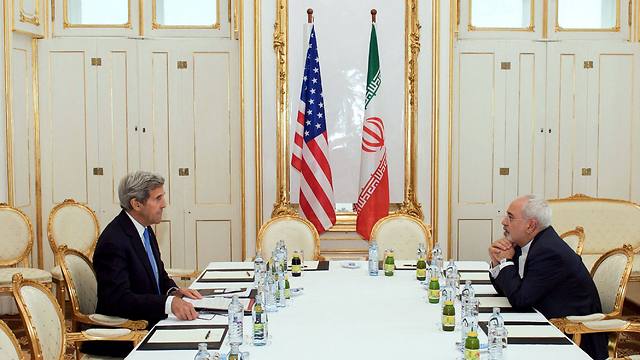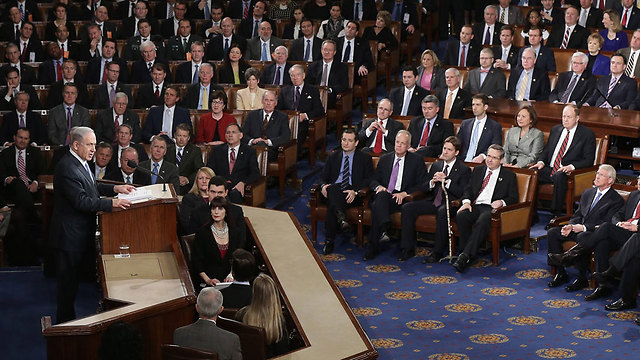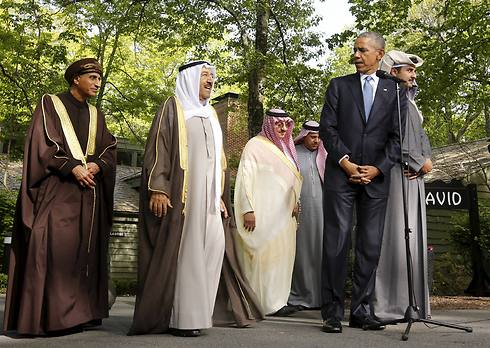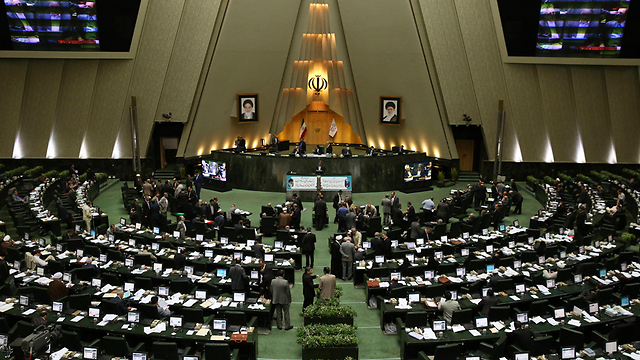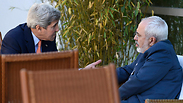
Signing of Iran deal could help fix strained Israeli-American ties
Analysis: As nuclear talks face another crisis, Israel is quietly preparing for day a deal is finally signed between Iran and world powers; but several concerning issues arise: Funds Iran will now have to support terror, and crazy arms race in region.
The Prime Minister's Office went into battle mode this week. Prime Minister Netanyahu instructed the ministers and relevant bodies - the National Security Council, the Foreign Ministry, the Defense Ministry and the IDF, to keep quiet. Even during day-to-day work with their American colleagues, they are barred from mentioning anything that concerns the agreement with Iran.
He didn't even want to hear a peep that might imply that Israel views the battle against the agreement with Iran as a lost battle. And he didn't want anyone to even hint at the fact that Israel is already preparing for the day after. Any comment made by an Israeli official - whether in uniform or not - which tries to portray the agreement with Iran as less than a national catastrophe, is viewed as sabotage of the government's policies.
Netanyahu pushed everyone aside just as he did on the eve of the elections. This is his campaign. Like an obsessive gambler, he won't leave the roulette table even when the numbers are against him. Now, he's upping his gamble. Netanyahu still believes that he's going to hit it big and break the bank. The Prime Minister's Office believes that even if Netanyahu can't stop the UN Security Council from lifting its sanctions over Iran, he could still prevent American sanctions from being removed using Congress.
The big drama over the extension of talks in Vienna happened on Wednesday. John Kerry and his people were not counting days, they were counting hours: If by Friday morning, Vienna time, an agreement is signed, what would be the time in Washington? And would that still count as July 9? There is a massive difference. Congress goes on hiatus on July 9. If the agreement is submitted before that, Congress is required to deal with it within 30 days. A month is a convenient period of time for the American administration, as it allows its opponents less time to mobilize against it. If the agreement is submitted after July 9, however, they will have at least two months to organize a campaign against it. The Iranians, who know this timetable well, took advantage of the catch 22 the American delegation was facing in order to try to extort better terms.
The PMO woke up on Wednesday morning with the hope that victory was closer than they initially estimated, and that President Obama himself would bring to the collapse of the talks. Jerusalem's wet dream is to see the members of the American delegation pack their suitcases and get on a plane. The leaks from conversations between President Obama and Congressmen about the fact there is less than a 50 percent chance of reaching an agreement, were met here with suspicion. Israel felt that this was a psychological trick in order to pressure the Iranian delegation, as the clear American interest to reach an agreement hasn't changed.
Israel assumes that if the delegations do indeed reach a critical juncture, the American president will postpone the signing for no longer than one month, while pretending there is a crisis and that America is standing firm. This trick of postponing, Israeli sources say, is no more than an attempt to win the trust of some Democrats in the House who are on the fence and threatening to vote with the Republicans against the agreement.
A diver's policy
The possibility of postponing the approval of the agreement bolsters Netanyahu. For him, this is a tactical victory. Israel has been completely cut off from the talks with the Iranians, but Netanyahu is a key player in Congress and the way things are looking now, whether there is a crisis in talks or not, he has no intention of disappointing the Republicans, who are looking for any way to trip up Obama. That is why he continues his onslaught, full speed ahead.
Obama wanted to see Netanyahu in Washington after the agreement is signed in Vienna and even before Congress votes on it. His invitation was for July. In August, Defense Minister Moshe Ya'alon was supposed to arrive in Washington as well. Obama wanted the two visits to serve as stimulus to convince Congress that the United States is compensating Israel for the agreement and helping protect its security.
But Netanyahu plans to arrive in Washington with an agenda that will be highly inconvenient to the president. He does want the compensation package, but as far as he's concerned, US lawmakers, especially Democrats, must not be given the impression that Israel was willing to live with what's cooking in Vienna, even if that agreement is rejected several months down the line.
So how can Israel get extensive security compensation package from the Americans, while at the same time continue its attack against the president and continue trying to convince the Democrats to join the Republicans and oppose the agreement? It's unclear. If Netanyahu goes to Washington, he will come only to attack the agreement and present what's been going on in Vienna as an existential threat. And so, those who believe the Israel-US relations have reached rock bottom - are optimistic. There is still a ways to go down.
What Netanyahu doesn't want the public to know is that for months now, there's been ongoing work at the National Security Council, the Defense Ministry, and the IDF - particularly in its Planning Directorate - regarding the day after the agreement is signed. They are discussing questions like: Is Israel's strategic standing going to be significantly damaged, necessitating a change in security perceptions? Should the defense establishment continue investing in its capabilities against the Iranian threat, or could it, at least in the next few years, direct some of these resources to other avenues? Partial answers to these questions can be found in the compensation list the defense establishment is currently working on, which includes weapons that are supposed to provide a response to the possibility Iran becomes a nuclear threshold country - this time with legitimacy from world powers.
In principle, the agreement with Iran, certainly in the first years of its implementation, is not supposed to significantly worsen Israel's strategic standing. The real damage is primarily one of deterrence, caused as a result of the poor relationship between Netanyahu and Obama, which clouds the strategic alliance and sends out the message that there is a rift between Israel and the United States. This problem must be resolved immediately.
The work done in the defense establishment stresses the vital need to improve mutual trust between the Israeli and American leaderships, and points to the fact that it's actually the signing of this agreement, which was what caused the rift, that creates an opportunity to improve relations. But these recommendations fall on deaf ears. The prime minister is dictating a policy more suitable to divers: Take a deep breath, get past President Obama, while sending the snorkel up every now and then to get oxygen. Which means, try to get the most out of the Americans without giving up on the fight against the agreement. This, of course, while hoping that the next president, preferably a Republican, warmly embraces the soaking wet diver.
But this diver's policy has its own limitations. If the trust between the two leaders is not rehabilitated and restored in the next year and a half, Israel will have a hard time convincing the American administration of the sincerity of its intentions when it points to Iran's violations of the deal. Israel doesn't believe Iran will meet its commitments and implement the agreement as written. That is why it must be part of the group that supervises Iran and part of consultations with the Americans and other world powers over Tehran's conduct. If there is no trust between Israel and the US, Jerusalem will be a minor partner at best.
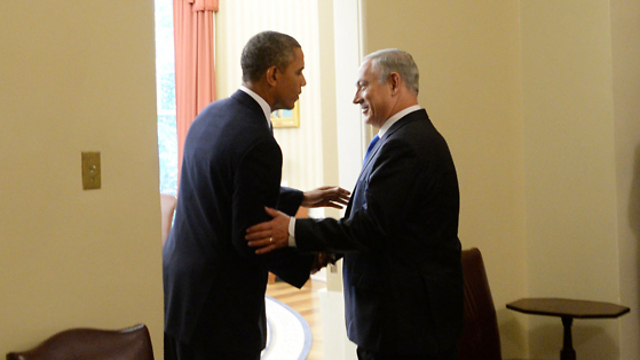
The Israeli defense policies, including when to use military power, should not change because of the signing of the deal. Changes to these policies are needed regardless because of the changes happening in Arab nations all around us and the rise of radical Islam near our borders.
The agreement with Iran presents two immediate problems that Israel needs to prepare for. The first is the flow of hundreds of billions of dollars to Iran over a short period of time. This money may be earmarked for the welfare of the Iranian people, but a big chunk of these funds will be diverted to the defense industry, to increase the production of military systems, and to spread arms among organizations and countries sponsored by Iran. The spillover of weapons systems to Lebanon, Sinai, Gaza and others, which has been challenging the Israeli defense establishment for years, will increase exponentially. The amount of money Iran could divert to terror activities and to supporting hostile regimes and organizations will also increase. The Shi'ite alliance in the region will be bolstered.
Israel already has a fairly efficient system in place to dealing with the spillover of Iranian arms to the region. The expected change will be in the scope and quality of the weapons being transferred. The defense establishment will therefore have to bolster its efforts on that front. But in order to deal with the increased scope of Iranian arms spreading in the region, Israel will need to cooperate with the British, the Americans and the French. And once again we are back to the same catch: If Israel continues its oppositional behavior on the Iranian issue, even after the deal is signed, it will face difficulties in creating such cooperations.
The second immediate problem the agreement poses concerns the frantic regional arms race of high-quality conventional weapons, which reached new heights this year with the signing of unprecedented, massive deals. Saudi will increase its arms acquisitions this year in over 50 percent. France alone signed arms sale deals over the past two-three years with countries in the region, totaling at $12 billion. During meetings held in May at Camp David, between the six Gulf countries, including Saudi, and the Americans, President Obama agreed to significantly increase US aid to these countries to ameliorate their concerns over the possibility sanctions imposed on Iran would be lifted.
In the past, the United State compensated Israel as part of the understandings and agreements between the two countries to maintain the IDF's military advantage over other countries in the region, including the more moderate ones. Advanced arms sold to Arab country were sold "without teeth" and did not include some of the parts Israel received. For example, we got radars for planes in one quality, while the Saudis got these radars in a lesser quality.
Now, in light of the agreement with Iran, Israel for the first time will not settle for an offer that merely maintains its qualitative advantage, but also demand to maintain its quantitative advantage, as the amounts of arms that have entered and will continue entering the Middle East as compensation to the Arab world against the Shi'ite-Iranian threat are enormous.
It would be hard to demand such a compensation package when the prime minister is going to Washington to confront the president, or worse - refuses to come, especially as the American administration is expected to demand Netanyahu to make a statement on the Palestinian issue as well.
At the time, Netanyahu refused a proposal by then-secretary of state Hillary Clinton for another F-35 squadron in return for the extension of the settlement construction freeze in the West Bank. Today, Israel cannot afford to forgo the American compensation package if it wants to maintain its qualitative advantage, all the more so when there is understanding and willingness from the American administration to be generous in its military aid to Israel.
The one entrusted with the committee that deals with maintaining Israel's military edge is the Defense Ministry's director-general, Dan Harel, who recently submitted a request to increase the annual US aid package to Israel from $3.1 billion a year to about $4 billion in the coming decade, starting 2017. This request may not be directly linked to Iran, but this is a convenient opportunity to raise it.
Under a nuclear umbrella
The defense establishment's situation assessment views with the current nuclear arms race in the region as a potential medium- to long-term threat. Countries like Egypt, Jordan, Saudi and Turkey might seek to acquire nuclear capabilities in light of the license given to Iran to turn into a nuclear threshold country.
There are a lot of myths concerning this issue, like the possibility of Saudi buying a bomb from Pakistan. The Saudis decided to build 18 nuclear reactors for the production of electricity even before the crisis with Iran. If they want, they can buy a bomb at any point in time. As for Egypt, it's doubtful it would chose to invest in nuclear development when it doesn't have the money to feed its citizens, and the fact Cairo would lose the American aid it receives if it starts dealing with nuclear weapons. The possibility of Jordan turning into a nuclear country is another interesting joke. The only question that remains open is Turkey. In any case, Israel needs to prepare for the possibility that the monopoly attributed to it over nuclear weapons in the Middle East will be lost.
Another issue concerning the defense establishment is how Iran will operate under the cover of a nuclear umbrella. It's doubtful that the rules of the game in Lebanon or in the Golan Heights will change under this umbrella, but Iranian nuclear capability could deter countries from attacking it.
There are several factors that could ameliorate the negative effects of the agreement with Iran over the region. There is the possibility that Iran, as a country with widespread economic ties all over the world, and one which enjoys enormous investments from other countries and international companies, the opening of embassies and the presence of tens of thousands of foreigners who will arrive at its gates, will conduct itself with a lot more caution than the leprous Iran.
Another ameliorating factor is the possibility of Israel having closer ties with regional countries based on having a common enemy. If you wake up a senior Saudi intelligence officer and the head of the Israeli Research Department in the middle of the night and ask them for a list of threats, there will be a lot of overlap between the two lists. Despite that, the Saudis have already made it clear to Israel - in secret, private conversations - that it would be hard to realize this shared interest in full and in public for as long as Israel fails to show willingness to renew talks with the Palestinians and to recognize the Arab peace initiative.
In light of possible cutbacks to the defense budget, IDF chief Gadi Eisenkot plans to examine the possibility of diverting some of the heavy investments made in dealing with the Iranian threat to other avenues, or spread these funds over more years. It would probably not make sense to touch these funds in the first few years after the signing of the agreement with Iran, as Israel doesn't believe Iran will meet its commitments, and the ability to strike against Iran's nukes might be put to the test over the coming decade.










